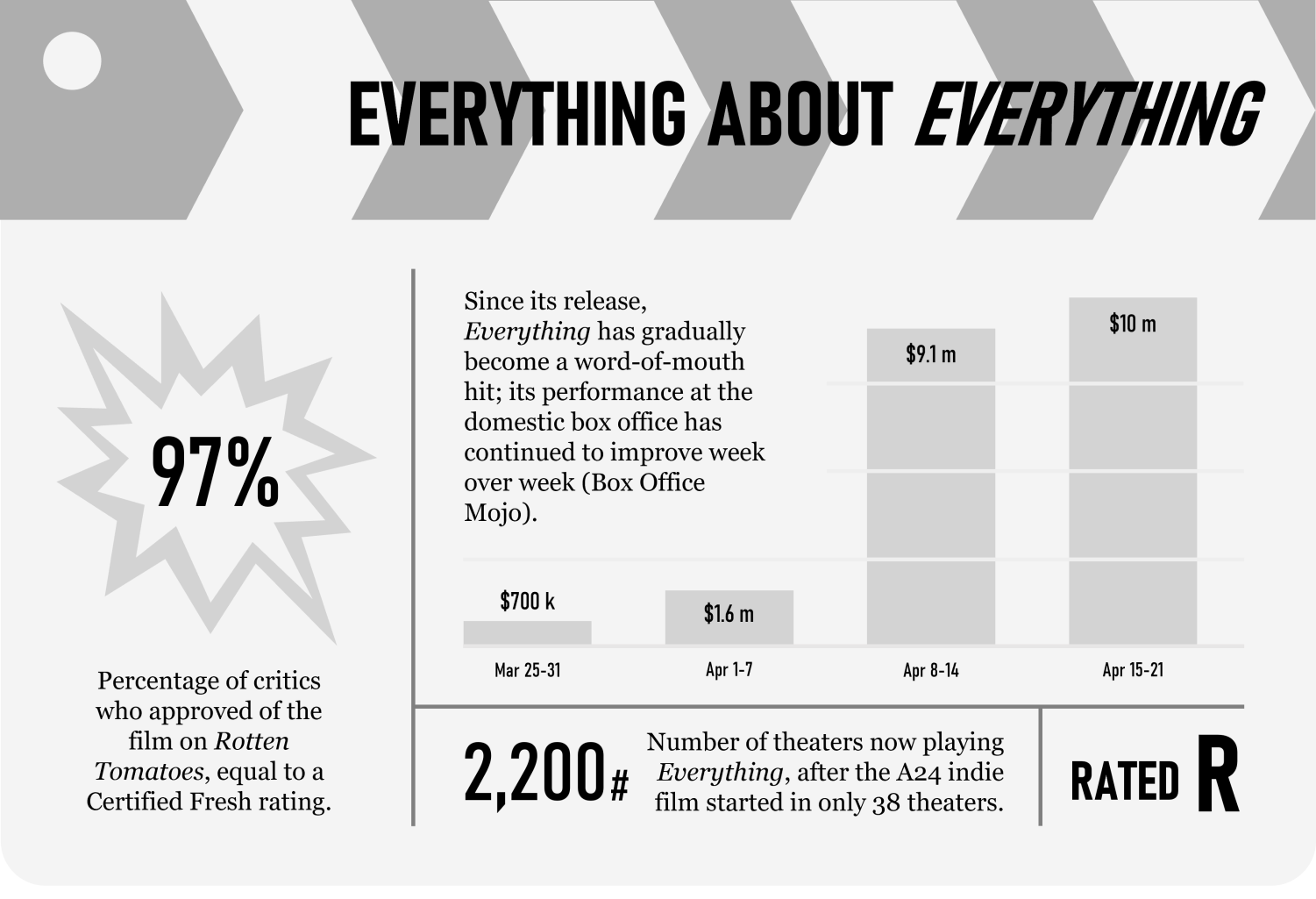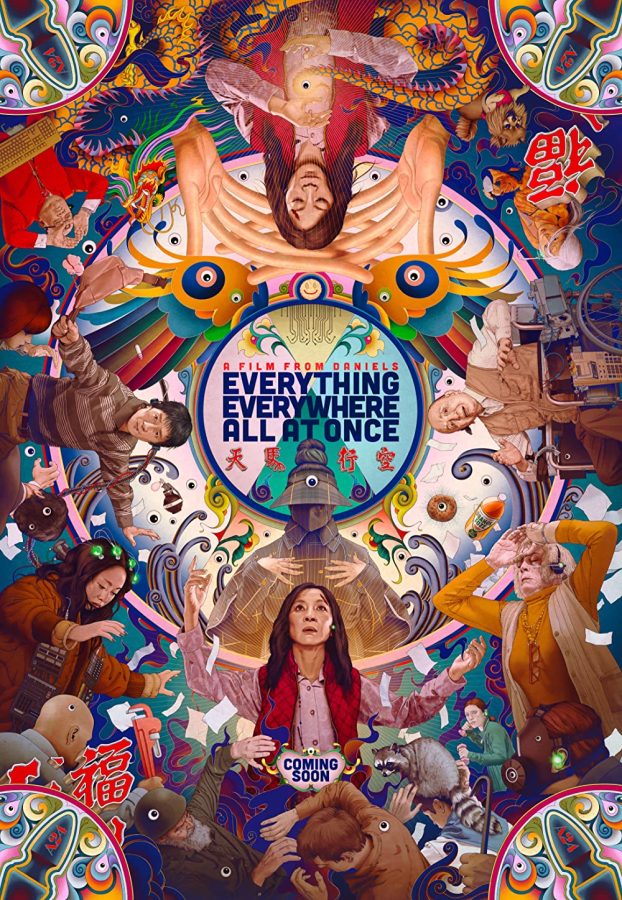Everything Everywhere All at Once, in a Word
How do I begin to describe this movie?
When I walked into the Lincoln Square Cinemark, five minutes past its listed start time, I never expected the wild ride I was in for—and never left the theater more satisfied with a pandemic-era production. There’s an intangible, indescribable chaos to this A24 flick, a madness that never lets up, a wild vibrancy which illuminates all of its 140 minutes. In any other film, a similar degree of complexity might totally derail the directors’ intentions; yet somehow, this one makes it work. Directed by Dan Kwan and Daniel Scheinert, Everything Everywhere All at Once is refreshingly original, half family drama and half multiversal epic, and fully a spectacle you cannot miss.
We start with a mirror and a Chinese immigrant woman named Evelyn (Michelle Yeoh). Our first encounter with Evelyn is, put simply, happy. In the silver reflection of the circular mirror, she sings through a karaoke machine, awash in a romantic blue-purple light, surrounded by family. Perhaps this opening scene represents past joys which Evelyn has lost touch with, or simply the web of what-could-have-been futures that Evelyn dreams for herself—yet there’s not much time to ponder before the audience is whisked into the mirror and brought forward into reality. Evelyn’s true life is situated over a laundromat, where she must take care of her business as well as her family. Her desk is covered with receipts, and a pot of noodles is boiling in the cramped kitchenette. Below, morning customers arrive as the laundry machines continue to churn.
Evelyn’s relationships are strained at best and unraveling at worst. Evelyn’s hard-to-please father (James Hong), visiting from China, constantly demands attention. Her humble but foolish husband, Waymond (Ke Huy Quan), despairs that their love has disappeared and now seeks a divorce. Evelyn’s daughter (Stephanie Hsu), meanwhile, seems to be drifting away from a mother whose way of life fundamentally differs from her own. Gone is the joy, karaoke, and motions of affection; life now revolves around simple transactions. Immediate family and the customers downstairs bring nothing but more stress and conflict. Everyone, seemingly, is an adversary.
This is where the movie gets weird. Really weird. On a visit to the IRS office, Waymond’s mind and body is taken over by a heroic Waymond from the Alpha universe, who tells Evelyn she is the only one who can defeat a dark power called Jobu Tupaki which has descended upon the entire multiverse. If that doesn’t make sense, imagine that Evelyn’s troubles with the laundromat and her family are embodied by the multiverse and its many perceived evils. Her husband is replaced with another man, who is decisive where Waymond is not. Her overbearing father becomes a gun-wielding henchman on the enemy side. Evelyn even follows on her impulse and punches the cruel tax auditor, who is reincarnated as a monstrous killer in another reality.
Unlike the superhero epics and obligatory crossovers of other movie multiverses, Everything emphasizes the importance of decision-making and the various futures ahead of each of us. Laundromat Evelyn is told she is the worst version of herself out of all Evelyns everywhere—yet this very lack of specialization and success can make her the victor against darkness. (It’s a message I find particularly empowering as pandemic restrictions are lifted.) This is not to say that the film lacks the same entertainment of modern superhero flicks. During fights, Evelyn “verse-jumps” to acquire the skills of other Evelyns: kung fu, breath control, the agility of a teppanyaki chef, and more. The resulting antics include a raccoon variation of Ratatouille, a world with sausage-fingered humans, an epic fanny pack action scene and exactly one Jamie Lee Curtis jumping down a stairwell. (Yeah, it’s crazy.)
While at times confusing, these big switches between realities allow Everything to be, well, everything. The film is at times horror and at times light comedy, hero’s journey and household chores, a tale of independence and romance and motherhood. Such versatility makes each new visual idea and fight scene refreshing and fun, and the viewer is constantly left guessing at how it all ends. In an era where most productions deal in increasingly heavy content or high-stakes sequels, Everything becomes the silly, heads-exploding-into-confetti bit of movie magic we all needed and missed.
Cut through the sci-fi allure and special effects, however, and this otherworldly drama somehow manages to be grounded in the real world. There’s something to be said about the role of Waymond, whose genuine friendliness and honesty put him at odds with historic representations of Asian American men in Hollywood. Ke Huy Quan plays a character who can be intelligent, supportive, and sometimes foolish without following the ‘evil martial arts villain’ or ‘obedient sidekick’ stereotypes. While Crazy Rich Asians and Shang-Chi have recently helped break down barriers in American media, Waymond proves that Asian American men don’t need sex-symbol masculinity to shine in complex lead roles. In Evelyn’s case, the multiverse appears as a manifestation of her overwhelming existence, a life splintering into many, as evidenced by the visual motifs that originate in her own environment. Michelle Yeoh brilliantly portrays a middle-aged immigrant mother who is battling her own struggles with expectations and family, not some colossal cosmic danger of yore. She grapples with all the choices she did and did not make in her life, and the multiverse becomes the place where she can physically deal with those personal emotions.
The film ends with a heartwarming resolution of Evelyn’s conflicts and the restoration of familial love. Yet even if the overall message is ordinary, this indie is an otherwise extraordinary breakthrough for representation and genre. Every second feels completely original and like never before, yet still deeply purposeful towards Evelyn’s development and the directors’ aims. The talent of the actors undoubtedly goes a long way towards making this production a wild, thrillingly unexpected and captivating joyride throughout.
So how should I describe this film? Everything Everywhere All at Once asks you to enjoy movies again, without obsessing over details and timelines and cinematic universes. It asks you to suspend your disbelief and have fun. To take joy in the silliness. To step out of the house, arrive at the theater five minutes late, and simply watch in wonder.
Everything Everywhere All at Once is in theaters now.

Hailing from Columbia, Missouri, Minoo is defined by his passion for playing the oboe and writing journalistic prose. With Hugo, his 9-year-old cockapoo,...

